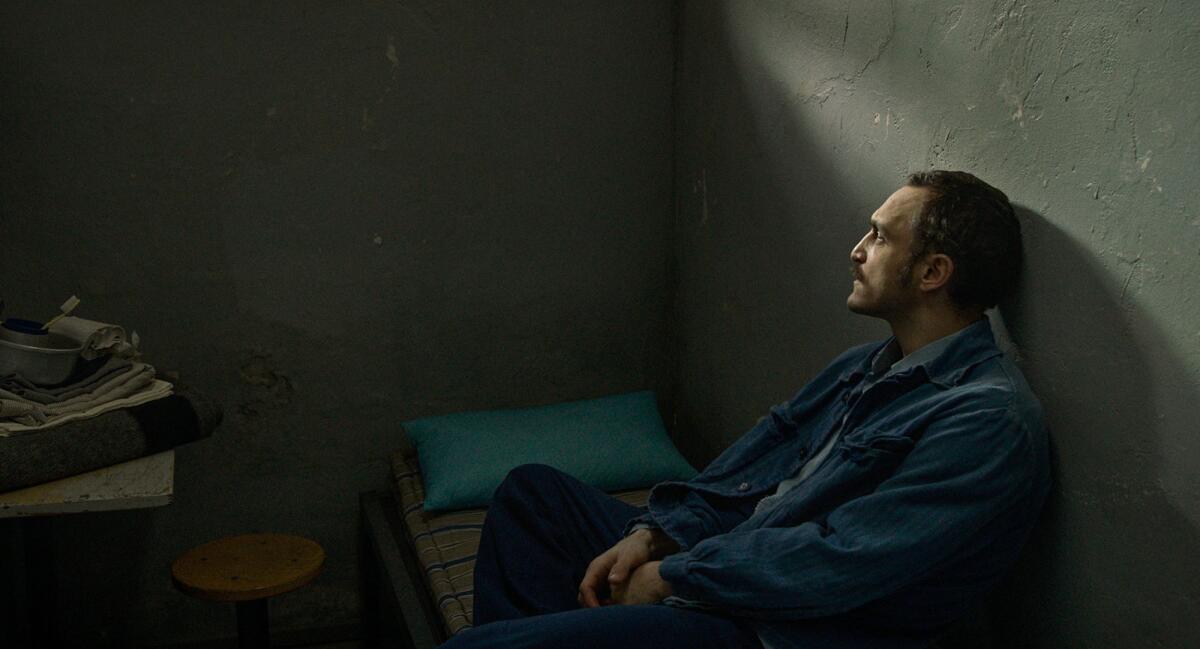SXSW Film Fest returns in person and ready for freewheeling fun
Hello! I’m Mark Olsen. Welcome to another edition of your regular field guide to a world of Only Good Movies.
Only good movies
Get the Indie Focus newsletter, Mark Olsen's weekly guide to the world of cinema.
You may occasionally receive promotional content from the Los Angeles Times.
The South by Southwest Film Festival gets underway Friday in Austin, Texas, taking place in person for the first time since 2019, looking to recapture its special, freewheeling magic. The festival opens with the premiere of Daniel Kwan and Daniel Scheinert’s “Everything Everywhere All at Once” and closes on the 19th with the premiere of the first episode of the long-awaited third season of “Atlanta.”
Other anticipated premieres include “The Lost City,” starring Sandra Bullock and Channing Tatum; Richard Linklater’s animated “Apollo 10 ½: A Space Age Childhood”; Ti West’s “X,” starring Mia Goth, Jenna Ortega and Scott Mescudi; Jeff Baena’s “Spin Me Round,” starring Alison Brie, Aubrey Plaza and Alessandro Nivola; and Tom Gormican’s “The Unbearable Weight of Massive Talent,” starring Nicolas Cage and Pedro Pascal.
I spoke to Bullock, Linklater, Ethan Hawke, Rosario Dawson and others about how it feels to be returning for an in-person festival, particularly one in Texas at a time state legislators are putting civil rights under attack.
“You look at Austin, it’s this tiny little enclave of progressiveness and open-mindedness and love and community,” said Bullock, who declared herself an “honorary Austinite.” “I never thought I’d find myself here, but I found myself here because of its diversity and its inclusivity. And it is surrounded by values that I don’t have, on many levels.”
“It’s the eternal dilemma of staying in Texas,” said Linklater, a longtime resident of Austin who said he has turned down honors from the state of Texas in the past. “That’s just how it is here. You go to a rally, you go to a protest, you vote in the primary, you just try to stick it out and make your voice be heard and you do what you can.”
I’ll be in Austin for the next few days, as will a photo and video team, so keep an eye out for more coverage from the festival.
In other news ...
The Spirit Awards were last weekend, moving from their usual spot on the day before the Oscars. Acting prizes went to Simon Rex for “Red Rocket,” Taylour Paige for “Zola,” Ruth Negga for “Passing” and Troy Kotsur for “Coda.” Maggie Gyllenhaal and “The Lost Daughter” won for directing, screenplay and best feature. Other film awards went to “Shiva Baby,” “Mass,” “Summer of Soul,” “7 Days” and “Drive My Car.”
Along with photographer Myung J. Chun, I talked to some of the attendees before the ceremony to get their thoughts on being back at an in-person awards show and the state of independent film, including members of the creative teams for the nominated films “Test Pattern,” “The Novice,” “The Killing of Kenneth Chamberlain” and others.
In Los Angeles, the American Cinematheque is starting a retrospective of artist and filmmaker Nina Menkes, running through March 26. The series includes new restorations of her films “Magdalena Viraga” and “The Bloody Child” as well as “Dissolution,” “The Great Sadness of Zohara,” “Phantom Love” and “Queen of Diamonds.”
Enjoying this newsletter? Consider subscribing to the Los Angeles Times
Your support helps us deliver the news that matters most. Become a subscriber.
‘Turning Red’
Directed and co-written by Domee Shi, “Turning Red” is the 25th Pixar feature and the first directed solely by a woman. Set very specifically in 2002 Toronto, the film tells the story of Meilin “Mei” Lee (voiced by Rosalie Chiang), a 13-year old Chinese Canadian girl who lives under the watchful eye of her overprotective mother Ming Lee (Sandra Oh), until Mei discovers that if she gets too excited or stressed out she turns into a giant red panda, a family curse. Featuring songs written by Billie Eilish and Finneas O’Connell, the film is streaming on Disney+.
For The Times, Justin Chang wrote, “That gender precedent is more depressing than laudable, and in appreciating the taboo-busting, culturally inclusive virtues of ‘Turning Red,’ we should be cautious about overpraising a corporate giant that’s always been quicker to congratulate itself than to evolve. … And so while ‘Turning Red’ has the fanciful, farcical complications you might recognize from other Pixar movies — supernatural twists, clever coincidences — its busy narrative machinery is driven by the inordinate pressure Mei feels to keep her worlds separate. Here, the horrors of bodily transformation and the challenges of cultural assimilation become one and the same.”
Tracy Brown spoke to Shi, an Academy Award winner for her short film “Bao.” Regarding a moment when Mei draws lusty pictures of a secret crush, she said, “I haven’t seen that before in a lot of movies, but it is an experience that, if you talk to any female artists, they have had. I just want people to discover that girls can be as weird and pervy and strange as boys can be with this movie.”
For Slate, Dana Stevens called the film a “groundbreaking coming-of-age tale.” While adding, “There aren’t many family-friendly movies that have taken on this kind of hot-button subject matter: the at times cruel power struggle between mothers and daughters, the awkwardness of early physical maturation, the way pop music and celebrity crushes can serve as vectors for burgeoning sexuality. (One climactic confrontation between Mei and Ming has the panda-fied Mei twerking her plushy tail in her horrified mother’s face while declaring ‘I like to GYRATE!’) That the studio gave a first-time director the freedom to explore these potentially sensitive themes, and to do so in a tone that is boisterous and playful rather than handwringing or self-serious, is a promising sign for Pixar’s future.”
For the Tribune News Service, Katie Walsh wrote, “‘Turning Red’ is a tale about learning to be yourself, and all the growing pains that go along with it, a process that’s hard enough without the unique trait passed down to all the women in Mei’s family. … This metamorphosis is triggered by that all-powerful force known as matriarchal mortification, or in layman’s terms, an embarrassing mom. The title ‘Turning Red,’ is a clever double-entendre for the female coming-of-age metaphor at the center of the film, as well as a nod to Chinese culture.”
For rogerebert.com, Tomris Laffly wrote, “And that is the genius of ‘Turning Red,’ a radical, brazenly hormonal PG movie that instantly fills a huge void in the lives of awkward, novel female teens who might just be starting to crawl out of their childhood cocoons with a disharmony of mystifying awakenings and sexual feelings. That achievement is perhaps no surprise coming from Pixar, a studio that can always be trusted for a generous dose of reflective, grown-up nostalgia as well as a good old-fashioned coming-of-age saga. … ‘Turning Red’ (which deserves a lot better than the straight-to-streaming fate Disney has bestowed upon it) feels pioneering and surprising even for the shop behind the groundbreaking animated sci-fi ‘WALL-E.’ For starters, never before has a Disney female ever been asked, ‘Has the red peony blossomed?’ as an inquiry about the start of her menstruation.”

‘Great Freedom’
Directed and co-written by Sebastian Meise, “Great Freedom” was Austria’s submission this year for the Academy Awards but missed out on a nomination. The film tells the story of Hans Hoffman (Franz Rogowski), a man imprisoned for being gay in post-World War II Germany thanks to a law dating back to the 1800s, and how he befriends a convicted murderer Viktor (Georg Friedrich) and looks to help a schoolteacher, Leo (Anton von Lucke), arrested at the same time as him. The film is playing in limited release.
For The Times, Robert Abele wrote, “Here [Rogowski] powerfully conveys 25 years of an ostracized, rebellious soul, someone whose sensitivity and desire are survival tools, not weaknesses — ways to always feel human. One of the film’s arcs is how he slowly breaks down Viktor’s homophobia over the years — a gentle campaign of caring that goes back to their meeting as cellmates in 1945 and that Friedrich’s portrayal matches in steeliness and vulnerability. Their scenes remind us why movies are so rich a storytelling art: We can see time collapsed into subtle, sometimes overt yet beautifully weighted gestures of connection, moments that gather in meaning.”
For the New York Times, Manohla Dargis wrote, “Low key, affecting and insistently unsentimental, ‘Great Freedom’ is a fictional story of resistance against this inhumane law, a story of salvation told one caress and sexual encounter at a time. For Hans, the bathroom is a refuge, a necessity, a pleasure zone and merely one of the many restricted, otherwise unloved spaces — almost all in prison — that he occupies and, in his way, liberates. Shortly after the movie opens, he is sentenced to two years without probation, a penalty that he doesn’t bother to challenge in court. Hans has his own way of protesting: He loves and has sex with who he wants, when he wants, how he wants.”
For rogerebert.com, Matt Zoller Seitz wrote, “The characterizations and performances are so exact and restrained — rooting their insights in actions and reactions rather than constantly announce what’s happening in the characters’ hearts — that the result is affecting and often wrenching cinema, about outsiders struggling to survive in a society that hates them and wants them to suffer.”

‘A Tale of Love and Desire’
Written and directed by Tunisian filmmaker Leyla Bouzid, “A Tale of Love and Desire” is the story of Ahmed (Sami Outalbali), a young Algerian man living in Paris, who begins a romance with a free-spirited Tunisian woman, Farah (Zbeida Belhajamor). The film is available on Laemmle’s virtual cinema.
For The Times, Carlos Aguilar wrote, “Ahmed’s personal struggles mimic the oppression in Algeria and throughout the Arab world. While scenes at home broaden this context, showing his uprooted father’s influence on him, the intermingling of all these ideas lacks strong cohesion. There are lyrical touches in the form of dance and magical realist inserts that act as a visual escape valve for the pressure that builds from the protagonist’s overwhelming uneasiness. … Outalbali’s apprehensively quiet portrayal of this repressed individual, out of touch with his Algerian identity, feels deliberately one-noted until a liberating turning point.”
For the Hollywood Reporter, Lovia Gyarkye wrote, “It’s easy to capture the frenzy of a new fling or the seductive meeting of two bodies; what’s more difficult, and what ‘A Tale of Love and Desire’ does quite well, is study the inner tensions that accompany early sexual experiences — when the heart, mind and body refuse to be in sync — without becoming overly cerebral. … Bouzid doesn’t shy from letting audiences into Ahmed’s messy interiority, enriching the movie as a whole. It’s an edifying and introspective film, with something valuable to say about embracing our most carnal impulses without shame.”

Only good movies
Get the Indie Focus newsletter, Mark Olsen's weekly guide to the world of cinema.
You may occasionally receive promotional content from the Los Angeles Times.




